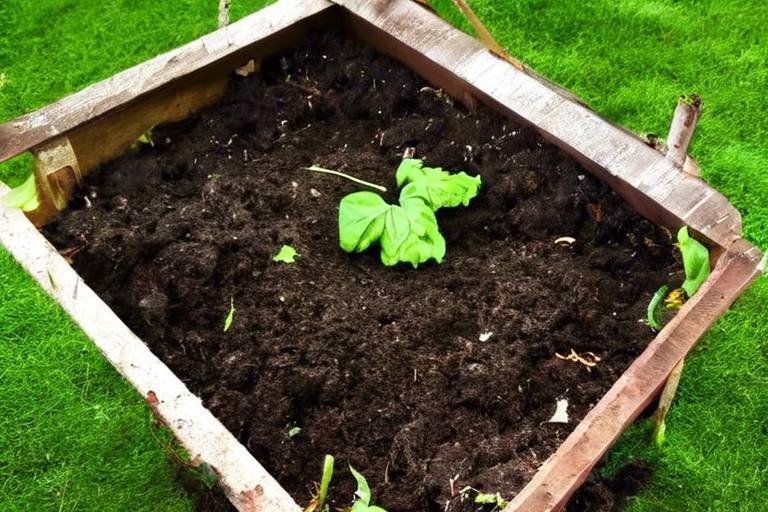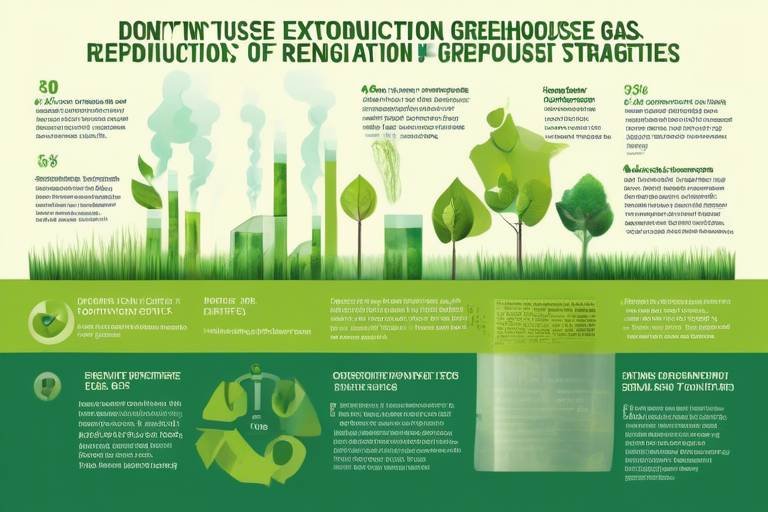10 Benefits of Composting - How to Get Started
Composting is not only beneficial for the environment but also for your garden and community. Let's dive into the top 10 advantages of composting and learn how to kickstart this eco-friendly practice right at home.
First and foremost, composting plays a crucial role in reducing waste by diverting organic materials from landfills. This process helps in decreasing methane emissions, a potent greenhouse gas, and contributes to a more sustainable waste management system.
One of the key benefits of composting is its ability to improve soil quality significantly. By enriching the soil with essential nutrients, compost enhances soil structure, promotes better water retention, and ultimately leads to healthier plants with increased crop yields.
When you compost organic materials, you are actively reducing your carbon footprint. This practice aids in lowering greenhouse gas emissions, thereby playing a part in combating climate change both locally and globally.
Composting is not only environmentally friendly but also cost-effective for gardening enthusiasts. It provides a free source of nutrient-rich soil amendment, reducing the reliance on chemical fertilizers and saving money on gardening supplies in the long run.
Supporting biodiversity is another crucial aspect of composting. Healthy soil resulting from composting supports a diverse range of microbial life, beneficial insects, and plant species, creating a balanced ecosystem in your garden.
By engaging in composting, you are promoting sustainable practices that align with a more environmentally conscious lifestyle. Composting closes the nutrient cycle, conserves resources, and fosters a sustainable living approach that benefits both the environment and future generations.
Compost-amended soil has enhanced water retention capacity, leading to improved water efficiency in gardening. This means less frequent watering is required, especially beneficial in regions facing water scarcity issues.
Composting initiatives have the power to boost community engagement by bringing people together. It fosters environmental awareness, creates opportunities for collaboration, and encourages shared learning experiences among community members.
Now, if you're wondering how to start composting, fret not! We've got you covered with practical tips and guidelines for beginners. From setting up a composting system to choosing the right materials and troubleshooting common issues, we'll help you kickstart your composting journey with confidence.

Reducing Waste
Exploring the advantages of composting and providing tips on how to begin this eco-friendly practice at home.
Composting plays a crucial role in reducing waste by diverting organic materials from landfills. When organic waste decomposes in landfills, it produces methane, a potent greenhouse gas. By composting at home, you can help mitigate these harmful emissions and contribute to a more sustainable waste management system. Imagine the impact of diverting kitchen scraps, yard waste, and other organic materials from the landfill, transforming them into valuable compost that enriches the soil instead of adding to the waste problem.

Improving Soil Quality
When it comes to through composting, the benefits are truly remarkable. Compost acts as a natural soil conditioner, enriching the earth with a plethora of essential nutrients that are vital for plant growth and development. By incorporating compost into the soil, you are not only providing plants with the necessary nourishment they need to thrive but also enhancing the overall structure of the soil.
Compost helps to create a more balanced environment for plants by improving soil aeration and drainage. This, in turn, promotes healthier root systems and allows plants to access nutrients more efficiently. Additionally, the organic matter in compost aids in retaining moisture, reducing the need for frequent watering, especially in dry conditions.
Furthermore, the microbial activity stimulated by compost in the soil plays a crucial role in breaking down organic matter and releasing nutrients in a form that plants can readily absorb. This microbial diversity not only benefits plant health but also contributes to the overall ecosystem balance in your garden.
Imagine your soil as a bustling city, with compost acting as the essential infrastructure that supports the growth and prosperity of its inhabitants - the plants. Just like a well-planned city layout enhances the quality of life for its residents, compost enhances the quality of soil, creating an environment where plants can flourish and thrive.

Reducing Carbon Footprint
Reducing our carbon footprint is a crucial step towards a more sustainable future for our planet. Composting plays a significant role in this endeavor by reducing greenhouse gas emissions that contribute to climate change. When organic materials decompose in landfills, they release methane, a potent greenhouse gas. By composting these materials instead, we can prevent methane emissions and help combat global warming. This simple act at the individual level can have a positive impact on the environment by reducing the amount of harmful gases released into the atmosphere.

Cost-Effective Gardening
Cost-effective gardening is a key benefit of composting that many enthusiasts appreciate. By creating your own compost, you are essentially producing a nutrient-rich soil amendment for your garden at no extra cost. This eliminates the need to purchase chemical fertilizers, which can be expensive and may contain harmful additives. Compost provides a natural and sustainable alternative that not only saves you money but also promotes healthier plant growth and overall soil quality.

Supporting Biodiversity
Supporting biodiversity through composting is like creating a vibrant orchestra in your garden. When you compost, you are not just recycling organic matter; you are nurturing a diverse community of life beneath the surface. The rich humus created from compost provides a nurturing environment for a myriad of organisms, from earthworms to beneficial bacteria. This thriving ecosystem contributes to the health of your plants, creating a harmonious balance that mimics nature's own design.
Imagine your garden as a bustling city where every resident plays a crucial role in the ecosystem. Composting acts as the conductor, bringing together a symphony of life forms that work in harmony to support plant growth and overall garden health. By promoting biodiversity through composting, you are not only enriching your soil but also creating a sustainable habitat for a variety of organisms that contribute to a thriving and resilient ecosystem.

Promoting Sustainable Practices
When it comes to , composting stands out as a shining example of environmental stewardship. By participating in composting, individuals actively engage in closing the nutrient cycle, a fundamental principle of sustainability. This process involves returning organic matter to the soil, enriching it with essential nutrients, and fostering a self-sustaining ecosystem.
Imagine composting as a recycling program for organic waste, where food scraps and yard trimmings are transformed into a valuable resource for soil health. This practice not only reduces the amount of waste sent to landfills but also contributes to the conservation of natural resources by creating a closed-loop system within your own backyard.
Composting embodies the essence of conservation and resourcefulness, showcasing how simple actions can have a profound impact on the environment. By diverting organic materials from the waste stream and returning them to the earth, individuals play a vital role in preserving the delicate balance of nature and promoting a more sustainable future for generations to come.

Enhancing Water Efficiency
Enhancing water efficiency through composting is a significant benefit that often goes unnoticed. When you incorporate compost into your soil, you are essentially creating a sponge-like environment that can retain water more effectively. This means that during dry periods, your plants have better access to the moisture they need to thrive. Additionally, the improved water retention capacity of compost-amended soil reduces the frequency of watering required, which not only saves time but also helps conserve water resources, especially in regions prone to drought.
Imagine your garden as a thirsty traveler in a desert. Without the proper water supply, it struggles to survive. However, with composting, you are providing your garden with a canteen full of water that it can sip from whenever needed. The compost acts as a reservoir, holding onto precious moisture and releasing it slowly to quench the thirst of your plants. This not only benefits your garden but also contributes to water conservation efforts in your community.

Boosting Community Engagement
Boosting community engagement through composting initiatives can have a profound impact on the environment and society as a whole. When individuals come together to compost, they not only reduce waste and create nutrient-rich soil but also build a sense of community and shared responsibility. Imagine a neighborhood where residents collaborate to compost their organic materials, sharing tips and experiences along the way. This collective effort not only benefits the environment but also strengthens the bonds between community members, fostering a spirit of cooperation and environmental stewardship.

How to Start Composting
Starting your composting journey is an exciting step towards a more sustainable lifestyle. To begin composting at home, you'll need to set up a composting system that suits your space and needs. First, choose a suitable location for your compost bin or pile. Ideally, place it in a shaded area with good drainage to prevent excess moisture buildup.
Next, gather the right materials for your compost. You can compost a variety of organic waste, including fruit and vegetable scraps, coffee grounds, eggshells, yard trimmings, and shredded paper. Avoid adding meat, dairy, and oily foods to prevent unpleasant odors and attract pests.
Layering your compost materials is essential for proper decomposition. Alternate between green materials rich in nitrogen, such as food scraps, and brown materials high in carbon, like dried leaves or straw. This balance provides the necessary nutrients for beneficial microorganisms to break down the organic matter effectively.
Turning your compost regularly helps aerate the pile and speed up the decomposition process. Use a pitchfork or compost aerator to mix the materials and ensure proper airflow. This also prevents the formation of compacted layers that can slow down decomposition.
Monitoring the moisture levels in your compost is crucial. The ideal moisture content is similar to a wrung-out sponge—damp but not waterlogged. If your compost is too dry, add water gradually. On the other hand, if it's too wet, mix in dry materials like straw or shredded paper to improve drainage.
As your compost matures, it will transform into dark, crumbly soil full of nutrients ready to nourish your plants. This process typically takes a few months to a year, depending on factors like temperature, moisture, and the mix of materials. Once your compost is ready, incorporate it into your garden soil to boost fertility and plant growth.
Frequently Asked Questions
- What can I compost?
You can compost a variety of organic materials such as fruit and vegetable scraps, coffee grounds, eggshells, yard waste, and shredded paper. Avoid composting meat, dairy, oily foods, and pet waste.
- How long does it take to make compost?
The time to make compost can vary depending on factors like the composting method used, the materials added, and environmental conditions. Generally, it can take anywhere from a few months to a year to produce finished compost.
- Do I need a special bin for composting?
While you can purchase a compost bin, you can also create a simple compost pile in your backyard using a designated area. Bins can help contain the compost and speed up the process, but they are not always necessary.
- Will composting attract pests?
Properly managed compost piles should not attract pests. Avoid adding meat, dairy, and greasy foods that can lure unwanted critters. Turning the compost regularly and maintaining the right balance of materials can help prevent pest issues.
- Can I compost in an apartment or small space?
Yes, you can compost in small spaces using methods like vermicomposting (composting with worms) or bokashi composting (fermentation). These techniques are compact and odor-free, making them suitable for indoor composting.



















